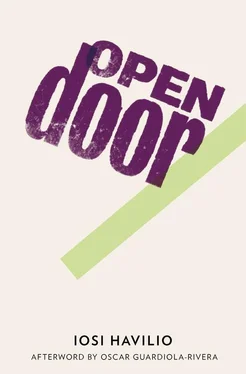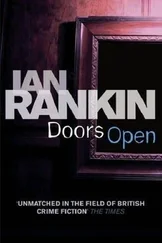As the minutes tick by, the glances that have been measuring him up, initially with apprehension, then with curiosity, and finally with compassion, give way to indifference and oblivion. Three or four stations further on, to bury the incident once and for all, one of the student priests decides to take out the guitar and, with some very rudimentary arpeggios, accompanies himself in a song in a strange form of Spanish that sounds rather antiquated, which gradually inspires the other young priests to join in with the chorus.
I arrived at Aída’s at around half ten, without thinking too much about why I was going there, whether it was to pick up my belongings, to find out whether Beba had any news or even in the hope that Aída herself would be there to surprise me with some preposterous anecdote that would bring the whole thing to a close. I went up to the fourth floor and when I tried to open the door of the flat my key wouldn’t even fit in the lock. I rang the bell a couple of times. Nothing, no response. I peeked through the gap next to the skirting board: complete darkness.
At the main door I came across the building manager, who was smoking with his back to me, a thin fishing rod under his arm. He wasn’t surprised to see me, in either a good or a bad way. He signalled that he’d be back soon and reappeared with a sheet of paper folded in three that was addressed to me, with Friday’s date and an official stamp. I read the heading. Subject: Urgent service of process. National Court of Criminal Instruction … It was a court summons for Monday morning at ten.
I start walking aimlessly, drifting. It’s almost midnight and the city reeks of a collective hangover. Kalton Family Hotel , says an illuminated sign half a block from where I am. I head over to it. I ring the bell, a little man with a moustache sticks the top half of his body over the counter, weighs me up, slightly surprised, and eventually opens the door. It’s no more than that, a typical family hotel, a solution.
‘Just one night,’ I say, ‘just for today.’
‘Twenty pesos for a private bathroom. Fifteen for shared.’
‘Private bathroom,’ I say, and the man is pleased.
Second floor, room twenty-seven, I find it hard to believe there are so many. I climb the stairs and walk from one end of the narrow corridor to the other, making the loose floorboards creak. There’s no sign of anyone, they’re all in their rooms, single men and women, families with children, couples, lovers: I can picture them all perfectly. The hallway is a war-zone, a violent crossroads of who knows how many televisions blaring all at once. Everyone against everyone else, the winners are those who dare to turn up the volume that bit more.
On the door of twenty-seven, the seven is missing. The room is essentially a giant bed enclosed in a kind of hole, a cement niche painted red. It’s hellish, it’s all there is. The carpet is flooded, as is my private bathroom. I’m too exhausted to ask to change rooms.
I lie down and the weight of my body forces the different lumps filling the mattress to spread around me. It’s like lying on a ball of uncooked dough. At least the bedside lamp works. I stretch out my arm, open the drawer of the bedside table and grab the only thing that’s in it, a slim book with a very soft cover that says on the front in Portuguese, imprinted in gold capitals: New Testament . And at the bottom: Free distribution . I let it fall open: John 9:1 . I read in a low voice:
‘As he went along, he saw a man blind from birth. His disciples asked him, “Rabbi, who sinned, this man or his parents, that he was born blind?”
‘“Neither this man nor his parents sinned,” said Jesus, “but this happened so that the works of God might be displayed in him. As long as it is day, we must do the works of him who sent me. Night is coming, when no one can work. While I am in the world, I am the light of the world.”
‘After saying this, he spit on the ground, made some mud with the saliva, and put it on the man’s eyes. “Go,” he told him, “wash in the pool of Siloam” (this word means “Sent”). So the man went and washed, and came home seeing.’
Very early on Monday. I’m woken by a chorus of strange noises from inside and outside the hotel. It’s a grey morning. I call the surgery and leave a message saying that I’ll be there around eleven.
‘I’ve got some urgent business to take care of,’ that’s what I say.
I dial Aída’s number to make some kind of arrangement with Beba to pick up the rest of my things. I try three times, and each time the phone rings out. Aída’s voice, recorded on the machine, no longer answers. Things are moving quickly.
The courthouse is a labyrinth of corridors. I keep returning to the same place, the wrong place: a desk where a policewoman sits in front of a very thick book. By this stage, she doesn’t even ask to see my ID before letting me go any further, as she did the first few times.
‘Which office are you looking for, love?’ she asks reluctantly, knowing that all of us here are after some office or other. She shows me where to go, it’s a bit more difficult than I had thought. None of the notions I had about the legal system are as fantastical as the reality.
Finally I come to the office indicated on the summons.
I make my presence known at the window. It’s really a door split into two. I’m told to wait in the corridor, they’ll call me. It takes fifteen minutes. People circulate around me, some in a hurry, some taciturn, alone or in groups of two or three, and I catch murmured snatches of a conversation already in full flow, all inference and tainted dialogue, unending. Almost all carry files under their arms: lawsuits, documents, warrants, statements, expert reports. A young couple and an older man exit from a door at the side. The couple seem uncomfortable, embarrassed. Whatever the reason for their summons, they hadn’t thought it would go this far. The man, meanwhile, puffs out his cheeks, holding back a smile.
My name is called.
‘Bernardo Yasky, court clerk,’ is how he introduces himself.
He’s young, with very thick eyebrows, neither fat nor thin, neither ugly nor handsome, with smooth skin and stubby hands. He doesn’t make eye contact for a single second during the half hour I’m there. He’s wearing a white shirt with thin blue and grey stripes, and a regulation black tie. His chest is very hairy, lots of little black curls showing through his shirt.
I tell him everything, almost exactly, while he types from memory, not watching the screen, his hands agile, as if they’d broken away from the rest of his body. He types and smokes. Afterwards, without looking at me, he reads out my statement.
Finally, he asks if I want to add anything. No, it’s fine like that. Then, at top speed, he finishes combining my words with the legal forms. Done, he says and wheels his chair over to the printer. He hurries the pages, pulling them out before they’re quite ready, and lays them in front of me as if this were a hand of poker and these were my cards. The guy stretches out his legs beneath the desk and unintentionally kicks my ankle with the toe of his shoe. I jump, I wasn’t expecting it and he over-apologises.
But he doesn’t draw back his legs, and once or twice I feel them brush mine again, inadvertently. As he marks the places where I have to sign with a faint pencil cross, he says, without lifting his eyes from the papers, almost smiling:
‘I’m rather clumsy.’
I read the last paragraph before signing: (…) I SWEAR under penalty of perjury that I have told the truth to the best of my knowledge and belief in response to the questions I have been asked . I sign, doubtfully.
Читать дальше












